November 24, 2012
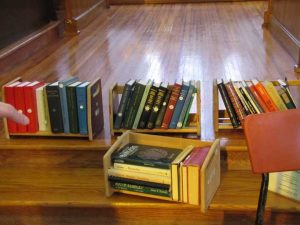 We met on this occasion in the sanctuary of St. Paul’s Anglican Church, the oldest church in Kingston. Our library holdings were still available, and looked rather dignified resting in the chancel of the church.
We met on this occasion in the sanctuary of St. Paul’s Anglican Church, the oldest church in Kingston. Our library holdings were still available, and looked rather dignified resting in the chancel of the church.
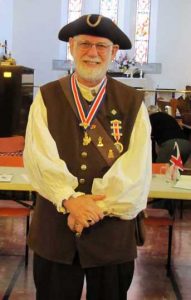 This was our Annual General Meeting, with the election of officers for the coming year. We also had the pleasure of hearing from the Dominion President of the UELAC, Robert McBride U.E.
This was our Annual General Meeting, with the election of officers for the coming year. We also had the pleasure of hearing from the Dominion President of the UELAC, Robert McBride U.E.
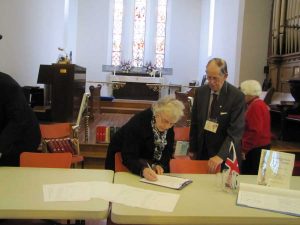
Audrey Bailey signs the meeting list, as John Chard observes. Lin Good in rear.
President Dean Taylor presented certificates to four individuals who have been members of Kingston and District Branch for twenty years without interruption: Peter Milliken, Peter and Carol Davy, and Terry Hicks.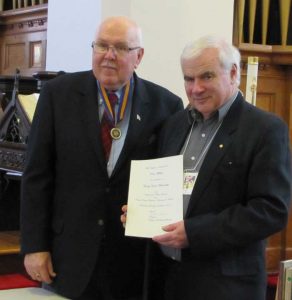 Right: Peter Milliken receives his certificate
Right: Peter Milliken receives his certificate
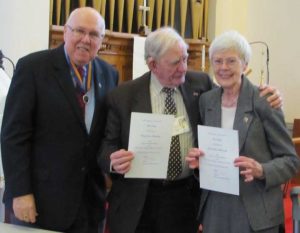 Left: Both Peter and Carol Davy have been active members for 20 years.
Left: Both Peter and Carol Davy have been active members for 20 years.
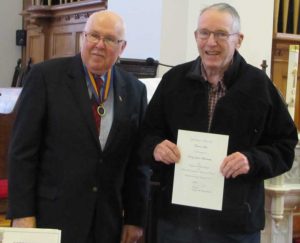
Terry Hicks usually provides piano accompaniment when we sing “O Canada” and the Royal Anthem.
Branch Genealogist Eva Wirth presented certificates to members who have completed the work to prove their descent from a United Empire Loyalist.
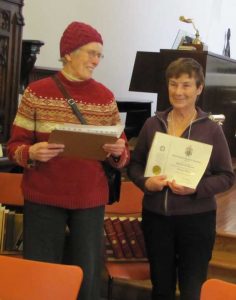 Left: Barbara Carson did the work to prove her descent from three different Loyalists: Edward Hicks, John Miller, and Lt. Henry Young
Left: Barbara Carson did the work to prove her descent from three different Loyalists: Edward Hicks, John Miller, and Lt. Henry Young
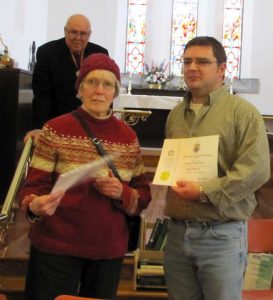
William Morrison had come all the way from Almonte to receive his certificate of descent from Peter Weaver.
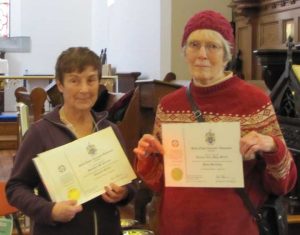
The third presentation Eva made was … to herself! She descends from John Horning.
Past President Lin Good presented the officers and committee chairs for 2013 — no elections were required, as all positions were filled by acclamation.
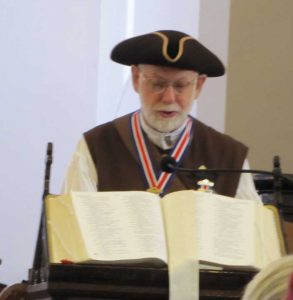 Our guest speaker, Robert McBride, then spoke about the United Empire Loyalist Association of Canada, giving some history of the Association and outlining various activities being undertaken by branches. He paid tribute to our own member John Chard, who was Dominion President from 1966 to 1968. John undertook to grow the association from only seven branches across Canada, and began the process that now sees 27 branches from coast to coast. John also established the Dominion office (based in Toronto) and library. With assistance from Col. Sam McLaughlin, former head of General Motors of Canada who established the McLaughlin Trust, John started the first national UELAC newsletter that morphed into the Gazette which all remembers receive today. Robert spoke of the goals of the Association, including uniting the descendants of United Empire Loyalists to preserve the history and tradition of their ancestors and perpetuate their memory. Bob concluded by urging all present to participate actively in the branch and the association: his own motto is
Our guest speaker, Robert McBride, then spoke about the United Empire Loyalist Association of Canada, giving some history of the Association and outlining various activities being undertaken by branches. He paid tribute to our own member John Chard, who was Dominion President from 1966 to 1968. John undertook to grow the association from only seven branches across Canada, and began the process that now sees 27 branches from coast to coast. John also established the Dominion office (based in Toronto) and library. With assistance from Col. Sam McLaughlin, former head of General Motors of Canada who established the McLaughlin Trust, John started the first national UELAC newsletter that morphed into the Gazette which all remembers receive today. Robert spoke of the goals of the Association, including uniting the descendants of United Empire Loyalists to preserve the history and tradition of their ancestors and perpetuate their memory. Bob concluded by urging all present to participate actively in the branch and the association: his own motto is
Encourages
Active
Members
January 28, 2012
Paul Van Nest, a retired teacher, is an expert on the U.S. Civil War. He is also a descendant of Loyalists.
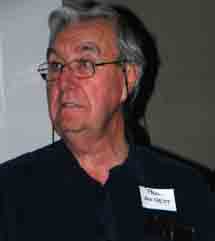 Paul told those assembled — after they enjoyed a friendly potluck lunch — that the Civil War was a major contributor to Canada’s Confederation. It made both British authorities and governments in the British North American colonies very nervous, when they realized how exposed their borders were to invasion from the US. Confederate spies and organizers established themselves in Canada and raided from Canada into Vermont, hoping to raise money by robbing banks as well as alarming the Northern states. Britain was allying herself with the South, and her Canadian colonies were obviously a closer target than England.
Paul told those assembled — after they enjoyed a friendly potluck lunch — that the Civil War was a major contributor to Canada’s Confederation. It made both British authorities and governments in the British North American colonies very nervous, when they realized how exposed their borders were to invasion from the US. Confederate spies and organizers established themselves in Canada and raided from Canada into Vermont, hoping to raise money by robbing banks as well as alarming the Northern states. Britain was allying herself with the South, and her Canadian colonies were obviously a closer target than England.
Hence the Charlottetown Conference was convened in September 1864, and the Quebec Conference later that year, while the Civil War raged to the south: Confederation was agreed upon, although it did not take effect until after the Civil War ended.
Interestingly, over 50,000 men of Canadian birth — many of them no doubt sons and grandsons of United Empire Loyalists — fought on both sides in the Civil War, mostly for the North. The $200 signing bonus, which was enough money to purchase a farm, was probably a strong incentive to do so, although many Canadians were also strongly opposed to slavery.
photo of Mr. VanNest courtesy Joyce Fingland
